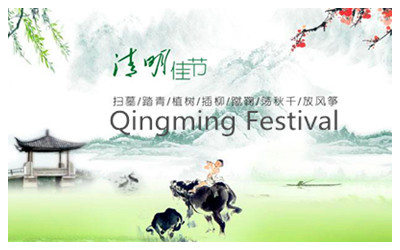
During the Qingming Festival, people visit their ancestors' graves, tidy up, remove weeds and sweep away leaves. This is why Qingming is also known as the Grave Sweeping Day. And according to the tradition, when sweeping the tombs, people should carry alcohol, food, fruit, flowers and and favorites of the dead, then burn incense and paper money and bow before the memorial tablet. During the ceremony, the food is laid in the front of the tomb, and paper money is burnt out, more earth should be placed on the grave, several willow branches are inserted on the graves, and kneel to the ground in expression of deep respect to the deceased.
However, in the ancient times, sweeping tombs is the activity of
Hanshi(Cold Food) Festival, which was usually one day before the Qingming Festival. People will not cook on that day and only cold food is served. Since date for the two festivals are so close, their customs are gradually integrated. When it came to the
Sui (581-618) and
Tang (618-907) dynasties, the two are blended into a unity when people sweep the tombs and make sacrifices to the ancestors.
Qingming is not just a day of remembrance, it is also a day to celebrate the coming of spring. The
Qingming Festival is a time when the sun shines brightly, the trees and grass become green and nature is again lively. Since ancient times, people have followed the custom of Spring outings. They go out for a picnic to appreciate the natural charm, fly a kite, have a swing, play football, plant trees.
Qingming Festiva is not only the festival when people pay homage to ancestors, cherish the memory of the martyrs, but also the ties for people to find their origins. What’s more important is the understanding of our ancestors, see their own shortcomings, correct themselves and lead to posterity. Perception of the value of life, remove the waste legacy of our ancestors, promote positive energy.

 During the Qingming Festival, people visit their ancestors' graves, tidy up, remove weeds and sweep away leaves. This is why Qingming is also known as the Grave Sweeping Day. And according to the tradition, when sweeping the tombs, people should carry alcohol, food, fruit, flowers and and favorites of the dead, then burn incense and paper money and bow before the memorial tablet. During the ceremony, the food is laid in the front of the tomb, and paper money is burnt out, more earth should be placed on the grave, several willow branches are inserted on the graves, and kneel to the ground in expression of deep respect to the deceased.
During the Qingming Festival, people visit their ancestors' graves, tidy up, remove weeds and sweep away leaves. This is why Qingming is also known as the Grave Sweeping Day. And according to the tradition, when sweeping the tombs, people should carry alcohol, food, fruit, flowers and and favorites of the dead, then burn incense and paper money and bow before the memorial tablet. During the ceremony, the food is laid in the front of the tomb, and paper money is burnt out, more earth should be placed on the grave, several willow branches are inserted on the graves, and kneel to the ground in expression of deep respect to the deceased.  Ask Questions ?
Ask Questions ?